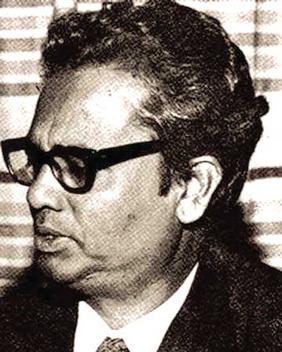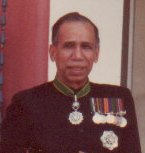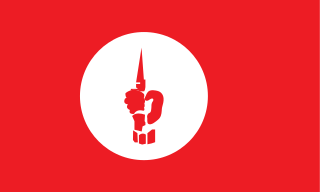Related Research Articles

Bangladesh, officially the People's Republic of Bangladesh, is a country in South Asia. It is the eighth-most populous country in the world and is among the most densely populated countries with a population of 170 million in an area of 148,460 square kilometres (57,320 sq mi). Bangladesh shares land borders with India to the north, west, and east, and Myanmar to the southeast. To the south, it has a coastline along the Bay of Bengal. It is narrowly separated from Bhutan and Nepal by the Siliguri Corridor, and from China by the mountainous Indian state of Sikkim in the north. Dhaka, the capital and largest city, is the nation's political, financial, and cultural centre. Chittagong is the second-largest city and is the busiest port on the Bay of Bengal. The official language of Bangladesh is Bengali while Bangladeshi English is also used in the government and official documents alongside Bengali.

Agha Muhammad Yahya Khan was a Pakistani military officer, who served as the third president of Pakistan from 1969 to 1971. He also served as the Commander-in-Chief of the Pakistan Army from 1966 to 1971. Along with Tikka Khan, he was considered the chief architect of the 1971 Bangladesh genocide.

Sheikh Mujibur Rahman, popularly known by the honorific prefix Bangabandhu, was a Pakistani and Bangladeshi politician, revolutionary, statesman, activist and diarist. As a politician, Mujib had held continuous positions either as Bangladesh's president or as its prime minister from April 1971 until his assassination in August 1975. Mujib successfully led the Bangladeshi independence movement and restored Bengali sovereignty after over two centuries following the Battle of Plassey in 1757, for which he is honoured as the "Father of the Nation" in Bangladesh who declared independence. His Bengali nationalist ideology, socio-political theories, and political doctrines are sometimes called Mujibism.

Sir Khawaja Nazimuddin was a Pakistani politician and statesman who served as the second governor-general of Pakistan from 1948 to 1951, and later as the second prime minister of Pakistan from 1951 to 1953.

The Bangladesh Liberation War, also known as the Bangladesh War of Independence and known as the Liberation War in Bangladesh, was an armed conflict sparked by the rise of the Bengali nationalist and self-determination movement in East Pakistan, which resulted in the independence of Bangladesh. The war began when the Pakistani military junta based in West Pakistan—under the orders of Yahya Khan—launched Operation Searchlight against the people of East Pakistan on the night of 25 March 1971, initiating the Bangladesh genocide.

The Bengali language movement was a political movement in former East Bengal in 1952, advocating the recognition of the Bengali language as a co-lingua franca of the then-Dominion of Pakistan to allow its use in government affairs, the continuation of its use as a medium of education, its use in media, currency and stamps, and to maintain its writing in the Bengali script.

A Short History of Pakistan is an edited book published by University of Karachi Press and comprises four volumes. The book is edited by Prof Ishtiaq Hussain Qureshi and provides a comprehensive account of the history of the Pakistan region and its people from the prehistory leading to the creation of Pakistan and East Pakistan which then became Bangladesh. Complete set of four volumes are sequentially titled as, Book One: Pre-Muslim Period by Ahmad Hasan Dani; Book Two: Muslim Rule under the Sultans by M. Kabir; Book Three: The Mughul Empire by Sh. A. Rashid; and, Book Four: Alien Rule and the Rise of Muslim Nationalism by M. A. Rahim et al.

Munier Choudhury was a Bangladeshi educationist, playwright, literary critic and political dissident. He was a victim of the mass killing of Bangladeshi intellectuals in 1971. He was awarded Independence Day Award in 1980, by the then president Ziaur Rahman's government, posthumously.
Kamal Hossain, better known as Dr. Kamal, is a founding leader, lawyer and politician of Bangladesh. He is known as the "Father of the Bangladeshi Constitution" and regarded as an icon of secular democracy in the Indian subcontinent. Hossain currently heads his own law firm in Dhaka. He retired from political activities and from the post of president of Gano Forum in October 2023.

1st East Bengal Regiment or 1st Bengal also known by its nickname The Senior Tigers of Bangladesh Army.

The Indo–Soviet Treaty of Peace, Friendship and Cooperation was a treaty signed between India and the Soviet Union in August 1971 that specified mutual strategic cooperation. This was a significant deviation from India's previous position of non-alignment during the Cold War and was a factor in the 1971 Indo-Pakistani war.

Bangladesh–Russia relations are the foreign relations between Bangladesh and Russia. Bangladesh has an embassy in Moscow and Russia has one in Dhaka and a consulate-general in Chittagong. Diplomatic relations between the USSR and Bangladesh were established on January 25, 1972. These relations have continued with Russia being the successor state to the Soviet Union.

South Asia is the southern subregion of Asia, which is defined in both geographical and ethnic-cultural terms. As commonly conceptualized, the modern states of South Asia include Bangladesh, Bhutan, India, the Maldives, Nepal, Pakistan, and Sri Lanka, and with Afghanistan often included, which may otherwise be classified as part of Central Asia. South Asia borders East Asia to the northeast, Central Asia to the northwest, West Asia to the west and Southeast Asia to the east. Apart from Southeast Asia, Maritime South Asia is the only subregion of Asia that lies partly within the Southern Hemisphere. The British Indian Ocean Territory and two out of 26 atolls of the Maldives in South Asia lie entirely within the Southern Hemisphere. Topographically, it is dominated by the Indian subcontinent and is bounded by the Indian Ocean in the south, and the Himalayas, Karakoram, and Pamir Mountains in the north.

The 1969 East Pakistan uprising was a democratic political uprising in East Pakistan. It was led by the students backed by various political parties such as the Awami League and National Awami Party and specially their student wings against Muhammad Ayub Khan, the president of Pakistan in protest of the military rule, political repressions, Agartala Conspiracy Case and the incarceration of Sheikh Mujibur Rahman and other Bengali nationalists.

Christophe Jaffrelot is a French political scientist and Indologist specialising in South Asia, particularly India and Pakistan. He is a professor of South Asian politics and history the Centre d'études et de recherches internationales (CERI) at Sciences Po (Paris), a professor of Indian Politics and Sociology at the King's India Institute (London), and a Research Director at the Centre national de la recherche scientifique (CNRS).

Quazi Golam Dastgir was a Bangladesh army general and diplomat. From 1975 to 1977, he served as the "Zonal Martial Law Administrator" for Dhaka Division.

The Mukti Bahini, also known as the Bangladesh Forces, was the guerrilla resistance movement consisting of the Bangladeshi military, paramilitary and civilians during the Bangladesh Liberation War that transformed East Pakistan into Bangladesh in 1971. They were initially called the Mukti Fauj.
Chowdhury is a title of honour, usually hereditary, originating from the Indian subcontinent. It is an adaption from Sanskrit. During the Mughal rule, it was a title awarded to eminent people, while during British rule, the term was associated with zamindars and social leaders. The common female equivalent was Chowdhurani.
The History of Indian foreign policy refers to the foreign relations of modern India post-independence, that is the Dominion of India (from 1947 to 1950) and the Republic of India (from 1950 onwards).
Nafis Ahmad (1911-1982) was a Bangladeshi geographer and educationalist.
References
- 1 2 3 4 5 6 7 "G. W. Ghoudhury, 71, Teacher, Diplomat. Columbia University Record, January 30, 1998". www.columbia.edu. 13 December 1997. Retrieved 30 January 2020.
- 1 2 3 4 5 Islam, Sirajul; Miah, Sajahan; Khanam, Mahfuza; Ahmed, Sabbir, eds. (2012). "Choudhury, Golam Wahed". Banglapedia: the National Encyclopedia of Bangladesh (Online ed.). Dhaka, Bangladesh: Banglapedia Trust, Asiatic Society of Bangladesh. ISBN 984-32-0576-6. OCLC 52727562. OL 30677644M . Retrieved 22 August 2024.
- ↑ Park, Richard L. (November 1969), "Review (several works)", Midwest Journal of Political Science, 13 (4): 676–679, doi:10.2307/2110084, JSTOR 2110084
- ↑ Palmer, Norman (1969). "Pakistan's Relations with India; 1947-1966 - Book review". Pacific Affairs. 42 (1): 113–115. doi:10.2307/2754895. JSTOR 2754895.
- ↑ Wayne, Wilcox (1969). "Pakistan's Relations with India: 1947-1966 - Book review". The Journal of Politics. 31 (3): 833–836. doi:10.2307/2128510. JSTOR 2128510.